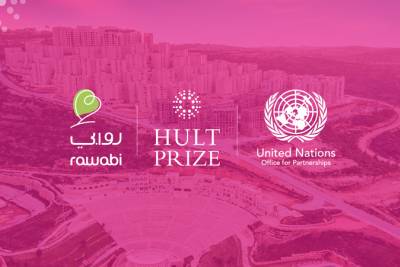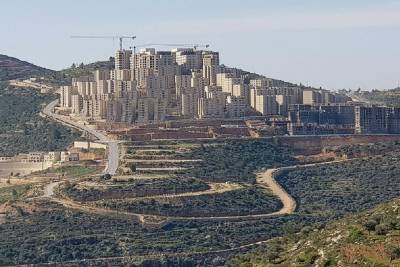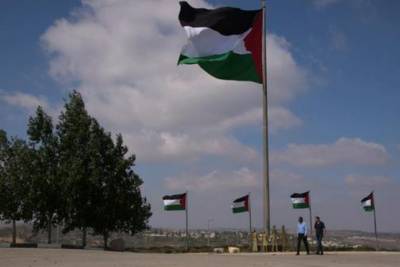Wonder City Rawabi: "This is our future"
Audiatur Online - Gil Yaron - It's a big idea, but Palestinian multimillionaire Bashar Masri is also a man of the right size. With the construction of a new city he wants to revolutionize the history of his own people. He pleads for building instead of armed resistance, initiative instead of sacrifice, tolerance instead of hatred - and thus has surprisingly much success.
The first words that many people associate with the Israeli-occupied West Bank are mostly negative: one thinks of terrorism, hatred, assassinations and army violence. But all this is looking for in Rawabi seemingly in vain. The newest city in the occupied territories reveals a completely different picture, and gives us an idea of what would be possible in the Holy Land, only attacking the Middle East conflict from another angle.
Hardly a place captures the quintessence of this daring economic and social private initiative of the Palestinian entrepreneur Bashar Masri better than a small coffee house in the middle of the Q-Center, an outdoor shopping center. Owner Murad Hanawi points with a wide gesture to the large esplanade, which is usually empty during the week. Nevertheless, he propagates unrestricted optimism: "This is our future," he says with a heartfelt smile. His cafe is called Schischapresso. It symbolizes what Rawabi stands for: just as the Arabic word for hookah (Schischa) and espresso complement each other, here the Orient and the Occident are to merge. In the city, where shishas and Italian coffee, Middle Eastern finger food and smoothies meet, ultra-modern planning should unite with Arab culture, Western European aesthetics, organization and home décor with Palestinian national pride. This synthesis has one goal: it should not only make the crew more bearable. It is to give Palestinians a new self-image in which not death, but life is celebrated.
A city of superlatives
Rawabi is in any way a highly ambitious undertaking. For decades the Palestinians have been fighting Israel for armed struggle, terror and increasing religious fanaticism. But in his new city in the West Bank entrepreneur and city founder Bashar Masri sets out on a completely new direction, revealing a new form of resistance: "We will live a normal life until our everyday lives become normal," he says. He does not want to make the crew happy. "This city does not show that we accept the occupation, but that we are a cultured people who want the best and deserve the best, despite the occupation." Superlatives are just good enough for him: In Rawabi live so far only 4,000 people , For the future, 22 quarters with 8,000 apartments and 25,000 inhabitants are planned. However, everything is laid out here: on the green hilltop, where the offices of Masri's construction company stand, blowing the largest flag of Palestine. A few hundred meters away was recently inaugurated the largest amphitheater in the Middle East with 15,000 seats, in which several open-air concerts already took place. In the "inner city" there is an indoor children's playground and soon five cinemas, one of them in 4D. In addition, a spa, gym, a 5-star hotel and a convention center will be built. Already every weekend thousands of Palestinians come here to have fun in the 135,000 square meter Wadina amusement park. Between wide green lawns there operate a cable car, a volleyball court, bungee jumping, a climbing wall. You can rent a SUV or a horse in the riding club. A water park is in planning. There is a Bedouin tent for events that can be rented for private events. And a tunnel in the mountain below, the Rawabis winery.

Sales staff in the Q-Center.
A city for Palestine's yuppies?
In the heart of the city, the Q-Center was opened - with 150,000 square meters the largest shopping center in Palestine. Only top brands were offered here to open a branch office: From Armani to Zara here are the big names of the world fashion industry represented. They offer their goods at top prices. Even for the Swiss, shopping here would be expensive: A Ralph Lauren polo shirt costs the equivalent of 150 euros, an Armani Jeans 300. "There are enough people in Palestine who can afford it, and so far have only been able to shop in Israel or Jordan", assures Masri. He had to reduce the advertising for the shopping center, because the visitor rush on weekends threatened to empty all shelves. The whole project is geared towards a new generation of young, educated, well-paid Palestinians. Huge advertising posters in the sales office show no traditional, stereotypical Arab families with many sons and mothers in the headscarf. Instead, a father with unveiled mother and daughter look dreamily on the hill (Arabic: "Rawabi").
Israelis are welcome, too
"Religious tolerance is very important in this city," says Masri, taking another sip of the Amerikano, which he enjoys on the large esplanade. These are not empty words: his construction company is building not only the second largest mosque in the Holy Land, but also a church - at his own expense. Because in the future, Christians should provide at least 10 percent of the population. "In these times when religion seems to be playing an increasingly important role, it is important to keep reminding the world and ourselves that we do not want to create a religious state but religious tolerance," says Masri. And if you do not want to know about religion, you can go jogging or go yoga classes in Rawabi's well-kept public parks before he or she enjoys a glass of wine in Q-Center. After all, the father of two daughters also writes: "We want women here to find jobs in the high-tech industry in order to be able to feed themselves." Everyone is welcome here - "even Israelis - as long as there are no settlers" Masri emphasizes. He had "worked with Israeli companies from the very beginning." Not only because a project of this magnitude would not be possible otherwise. It also has another reason: "I want to involve Israelis so that they see who we Palestinians really are: positive people who build something. So they become our lobbyists on the other side who are working to make the checkpoints and settlements disappear. "
All alone, without help
Not least because of this cooperation with Israel Masri is attacked in their own circles again and again. Islamists and hardliners accuse him of softening the people instead of steeling them for armed struggle. "I do not believe in military resistance," he comments shortly, and then immediately emphasizes: "Not a single political party has publicly criticized my plan." But also not necessarily supported. When he first came up with his idea of a completely private-initiative new city a decade ago, he was considered a dreamer or a spinner. There was hardly any help, and if only indirectly: The Palestinian Authority (PA) was said to have helped the magnate to expropriate thousands of owners from the surrounding villages in order to make room for the city. There, many are still angry with him. Because they can not afford an apartment here. Perhaps that's why Palestinian President Mahmoud Abbas has not yet visited the city, although his office in Ramallah is only a 15-minute drive away. Or because he did not actually do anything to help Masri: "The PA is collecting taxes, but so far has not invested in Rawabi: From the access road, the sewage treatment plant and the clinic to the only school we finance from private funds "We had to pay and build everything ourselves," says Masri visibly disappointed. "Together with Qatar, which spends 60 percent of its budget, I've invested billions here - not to make a profit, but to pioneer," says Masri. He puts his losses at $ 100 million.

Construction work.
The fear of Israel
But nothing worries this optimist more than Israel, with whom he actually wants to make peace. The military administration was "unhelpful," he says with a typical understatement. The approval for the construction of a water pipe came with one and a half years delay, which drove 452 of 639 of its customers to cancel their purchase contracts - a huge loss. However, given the over-bureaucratic bureaucracy in the PA and Israel, it remains unclear whether this was political intent or simply inefficiency. Finally, many Israeli military and politicians, including the right, praise Rawabi as a model project. However, it could be worse for Masri at any time: "All Israel has to do, so that everything goes down the drain here and I bankrupt, is to set up a checkpoint at the entrance to Rawabi - as they did a few days ago," says Masri , If two young soldiers on the narrow driveway "control everyone and the ride from Ramallah takes 15 hours instead of 15 minutes, no one will come here - neither for shopping nor for living." His dream of a new, clean, peaceful and tolerant Palestinian society could be ruined so quickly.

Amusement Park Wadina.
More than just a dream
On the wide sidewalks between the high-rise buildings, which are connected with fiber-optic cables, one notices nothing of fears and tensions. The traffic-calmed lanes are lined with green parks and playgrounds - a street scene that you will not see anywhere else in Palestinian cities. After all, Masri is not just about selling apartments. He has a vision for his people: "Our goal is a secular, free Palestine where everyone is welcome," he says. Still only a small part of the population can afford to actively participate in this vision, to live in it. But their influence is far greater than their number: The once ridiculed, later criticized Rawabi is increasingly recognized by Palestinians as a model of success. Which raises the hope that Masri's dream of a prosperous, peaceful Palestine on the part of Israel does not necessarily have to become a stillbirth; And that the associations that people in all of them have with the word "West Bank" could someday only be positive.
To view original article in German, Click Here.
To view original translated article, Click Here.




